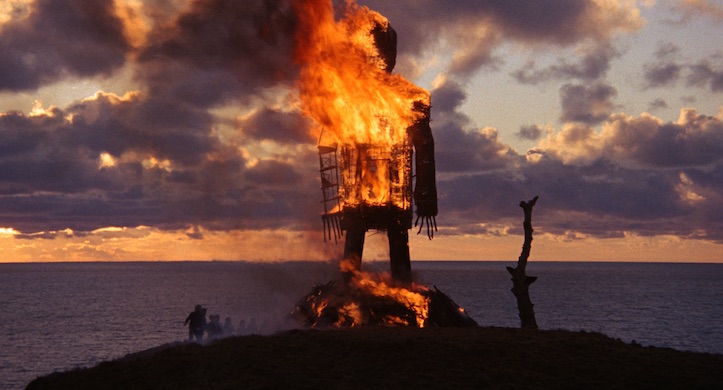1973’s ‘The Wicker Man’ Earns a Week of Screen Time at 2023’s IFC Center
One film scholar intimates that cult movies can vary in quality and appeal mostly to those given to extreme tastes — and so it is with ‘The Wicker Man.’

‘The Wicker Man’
IFC Center
July 7-13
Who was it that said cult movies are never quite as good as their fans believe them to be? While it wasn’t Danny Peary, the film scholar and sports journalist, his “Cult Movies,” a three-volume set of books enumerating “the classics, the sleepers, the weird, and the wonderful,” is a lodestar for movie buffs. Mr. Peary does intimate that cult movies can vary in quality and appeal mostly to those given to extreme tastes — and so it is with “The Wicker Man” (1973), which will be having a one-week revival at the IFC Center starting July 7.
Mr. Peary’s essay on “The Wicker Man” appears in the second volume of “Cult Movies,” lodged between entries for “White Heat” (1949) and “Willy Wonka and the Chocolate Factory” (1971) — that is to say, between a pathological momma’s boy portrayed by James Cagney and Gene Wilder at his most arcane. Given that Christopher Lee, he of the stentorian voice and regal demeanor, appears in drag toward the end of “The Wicker Man,” and none too convincingly, the surrounding company is somehow fitting.
What is it about “The Wicker Man” that prompts such fervor? Among the chief draws of the film, at least in the years directly following its release, was its inaccessibility. Upon its completion, the picture went through a host of studio revisions that left screenwriter Anthony Schaffer and director Robin Hardy flabbergasted. Distribution was wanting. The film, through all the tribulations to which it was subjected, became an epitome of the undersung, underseen, and bastardized masterpiece.
The catch is that “The Wicker Man” isn’t a masterpiece. The story of a Christian detective confronting an outpost of Celtic heretics on a remote Scottish island is addled by many things, not least a soundtrack whose folk balladry is as cloying as it is oddly deployed. Did Hardy really tell the cast and crew midway through filming that he was making a musical? They thought they were making a horror film. Here is a genre mash-up that’s a little too lumpy.
Characters break out into song at moments both opportune and not. “Willow’s Song” is assayed by the barkeep’s daughter (Britt Eklund) in the attempt to seduce the puritanical Sergeant Howie (Edward Woodward). She doesn’t succeed but the scene is memorable, as Ms. Eklund lip-syncs the words as she and her body-double sashay around in the altogether. Adolescent boys are, undoubtedly, a significant component of the film’s cult.

“The Wicker Man” was a conscious attempt by Schaffer and Lee to craft a film that was a cut above the standard horror flick — the kind of thing that made Lee a star at Hammer Studios. The erstwhile actor bought the rights to David Pinner’s novel “Ritual,” and Shaffer ran with its story of a city detective, country heretics, and ritual murder. Sergeant Howie travels to Summerisle having received a tip about a missing teenage girl. The locals are as obfuscating as they are picturesque. And, my, don’t the young folk enjoy coupling in public?
“The Wicker Man” is best viewed as a hangover from the 1960s, what with its anti-Enlightenment purview and let-it-all-hang-out ethos. That countercultural frisson is undoubtedly why the movie has a hold on the popular — or, rather, semi-popular — imagination. The title figure is based on an druidic effigy in which animals and humans were purportedly burned for ritual sacrifice. Julius Caesar took note of the practice, as do those who trek out to the desert Southwest at the end of every summer for the pseudo-libertarian free-for-all known as Burning Man.
The final moments of “The Wicker Man” are as unnerving as they are reputed to be, and the film benefits mightily from the snitty righteousness of Woodward’s performance. Lee relishes his performance as Lord Summerisle more than is good for a picture that already teeters on the edge of the ridiculous. Then again, were the movie sensible, it wouldn’t be quite as memorable.
It’s worth mentioning, by the way, that Sergeant Howie proves more ecologically correct about farming practices than do the dedicated back-to-the-land agronomists of Summerisle. Western rationalism, it turns out, is more than it’s cracked up to be. That is one of the more surprising paradoxes of a very odd movie.

